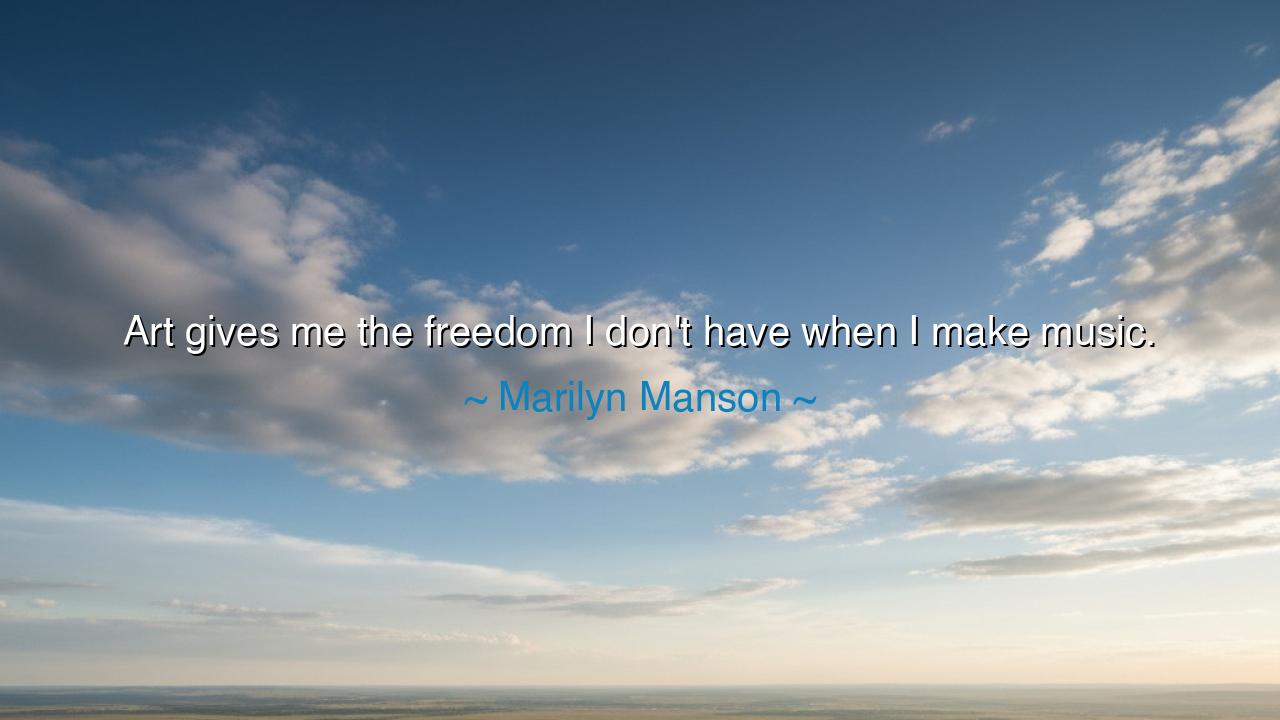
Art gives me the freedom I don't have when I make music.






Host: The room was quiet, bathed in the soft, golden light of the lamp. Outside, the world had settled into the stillness of night. Jeeny sat at the table, her fingers lightly tracing the rim of her cup, deep in thought. Jack, standing by the window, gazed out at the darkened world, absorbed in reflection. There was a sense of calm between them, yet an unspoken understanding that a deeper conversation was about to unfold.
Jeeny: (breaking the silence, her voice calm but reflective) “I came across something by Marilyn Manson today that really struck me. He said, ‘Art gives me the freedom I don’t have when I make music.’ What do you think about that?”
Jack: (pauses, his voice thoughtful) “That’s an interesting perspective, isn’t it? Manson is essentially saying that the act of creating art—whether it’s music, painting, or something else—can offer a kind of freedom that music itself might not always provide. When we think of music, especially in his world, there’s often a structure, a discipline, and expectations that come with it. But with art, there’s more room for expressing emotion without those constraints. It’s almost as if he’s saying that art allows him to explore deeper parts of himself that might not always fit into the form of music.”
Jeeny: (nodding slowly) “Exactly. There’s something incredibly liberating about art. It’s less bound by rules or structure than music sometimes can be, and that freedom allows for a different kind of expression. With music, even though it can be deeply personal, there’s often a need to align with specific sounds, rhythms, or formats. But with art, Manson seems to be saying he has more room to break the rules and explore his creativity in a more unrestrained way.”
Host: The stillness in the room deepened, as the conversation unfolded into a reflection on how different creative processes offer unique forms of freedom. Jack turned slightly toward Jeeny, his expression softening as he considered the deeper meaning of Manson’s words. Outside, the world had quieted, but inside, their conversation had turned inward, reflecting on the nature of art, music, and the freedom they can provide.
Jack: (his voice quieter now, more introspective) “I think what’s fascinating is how Manson views art and music in such different ways. Music can have its own set of rules—rhythms, beats, structures—but art, in its many forms, can be much more fluid. It’s about expressing something without the confines of a structure, creating freely. It’s about finding the space to express yourself without needing to conform to expectations. In that way, it offers a different kind of release.”
Jeeny: (softly) “Yes, and I think it speaks to how different creative outlets allow for different types of emotional expression. Music might be deeply personal, but it’s also often shaped by conventions, by what’s expected from the genre or the audience. Art, however, feels like a more personal experience, where you can pour yourself into it in ways that might not make sense to others, but that’s okay. There’s no need for it to be understood the same way music is—it’s about the feeling it evokes, not about fitting into a specific box.”
Jack: (nodding slowly) “Exactly. And maybe that’s why artists like Manson find a unique sense of freedom in their work. When you’re not tied to expectations, you can create something that is completely authentic, something that speaks to who you are at your core. There’s a kind of liberation in knowing you can create without needing to answer to anyone else’s definitions of what your work should be.”
Jeeny: (smiling gently) “Yes, and I think that’s what’s so beautiful about the creative process—the freedom it offers to express yourself in ways that are true to you. No matter the medium, there’s an incredible sense of release that comes with creating something that’s purely yours, without limitations.”
Host: The quiet between them felt deeper now, as the conversation continued to unfold. Outside, the world had quieted, but inside, there was a shared understanding about the liberating nature of art—how it allows for personal expression and creative freedom. Jeeny and Jack had uncovered the truth in Manson’s words—that art, in its many forms, offers a kind of freedom that other creative processes might not, allowing the artist to break free from constraints and explore their emotions in a deeply personal and unrestricted way.
Jack: (smiling softly, his voice more assured) “It’s a reminder that sometimes the truest form of creativity isn’t about fitting into what’s expected, but about embracing the freedom to express yourself authentically. Art can be an open space to explore without boundaries.”
Jeeny: (nodding warmly) “Exactly. When we allow ourselves to step beyond the rules, we find a deeper level of creativity, one that isn’t confined by the usual structures. And in that freedom, we uncover something truly unique and real.”
Host: The world outside had quieted, but inside, the room was filled with understanding. Jeeny and Jack had uncovered the deeper meaning of Manson’s words—that art offers a freedom that other forms of creativity may not, allowing for personal expression without constraints. The night continued outside, but inside, the room felt full of the realization that true creative freedom comes when we step outside the boundaries and express ourselves without limits.






AAdministratorAdministrator
Welcome, honored guests. Please leave a comment, we will respond soon